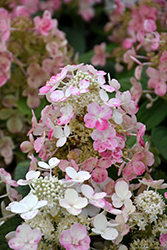>> Home
Torch™ Hydrangea
Hydrangea paniculata 'HPOPR018'
Height: 5 feet
Spread: 5 feet
Sunlight:
![]()
![]()
Hardiness Zone: 3a
Brand: Bloomin' Easy
Description:
A compact selection with a sturdy, upright form; early blooming white flowers persist all summer, aging to bright red in fall; smaller stature make it an ideal choice for smaller landscapes
Ornamental Features
Torch™ Hydrangea features bold conical white flowers at the ends of the branches from early summer to late fall, which emerge from distinctive creamy white flower buds. The flowers are excellent for cutting. It has dark green deciduous foliage. The textured oval leaves do not develop any appreciable fall colour.
Landscape Attributes
Torch™ Hydrangea is a multi-stemmed deciduous shrub with a more or less rounded form. Its average texture blends into the landscape, but can be balanced by one or two finer or coarser trees or shrubs for an effective composition.
This shrub will require occasional maintenance and upkeep, and is best pruned in late winter once the threat of extreme cold has passed. It is a good choice for attracting bees and butterflies to your yard. It has no significant negative characteristics.
Torch™ Hydrangea is recommended for the following landscape applications;
- Accent
- Mass Planting
- General Garden Use
Planting & Growing
Torch™ Hydrangea will grow to be about 5 feet tall at maturity, with a spread of 5 feet. It tends to fill out right to the ground and therefore doesn't necessarily require facer plants in front, and is suitable for planting under power lines. It grows at a medium rate, and under ideal conditions can be expected to live for 40 years or more.
This shrub does best in full sun to partial shade. It prefers to grow in average to moist conditions, and shouldn't be allowed to dry out. To help this plant achive its best flowering performance, periodically apply a flower-boosting fertilizer from early spring through into the active growing season. It is not particular as to soil type or pH. It is highly tolerant of urban pollution and will even thrive in inner city environments. Consider applying a thick mulch around the root zone in winter to protect it in exposed locations or colder microclimates. This is a selected variety of a species not originally from North America.
